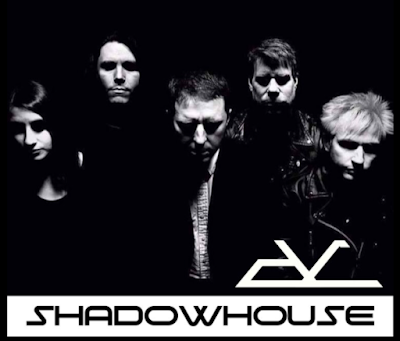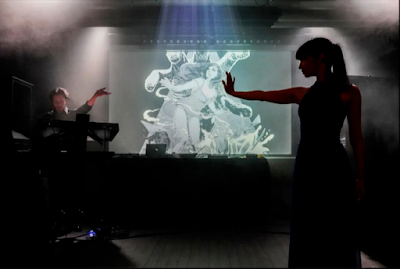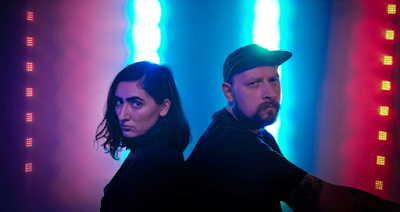“...there is definitely some intent there, but I also don’t know that I could do anything other than this.”
This has been a busy month for Darkness Calling with the launch of our Cult, the reveal of our charity compilation YOU ARE NOT ALONE, and several additions to our flagship playlist.
With all of that said, we knew we couldn’t pass up the chance to learn more about LOSSES — a post-punk act that just unleashed its new EP, Spirit Crusher.
We featured the titular track last Friday, and we were instantly hooked. There’s a playfulness to LOSSES’ sound, but also a gripping sense of dread that’s hard to put a finger on. It’s post-punk at its finest.
Darkness Calling was happy when the artist behind LOSSES agreed to speak more about his process and the inspirations behind his innovative sound. Read on below, and be sure to listen to his EP in full wherever you get your music.
DARKNESS CALLING: Thanks again for chatting with us! I know you've been making music since at least 2018 as "LOSSES." What can you tell us about the origins of this project and your musical experiences prior to LOSSES?
LOSSES: Thank you for taking an interest in my work and for featuring me on your playlist; I really appreciate it. Also, again, I loved the NIN article you guys did. [Editor’s note: You can check that out on our Cult page.] Pretty Hate Machine was the first "rock" record I got as a kid. My older sister gave it to me when I was in 5th grade and I didn't know what any of the lyrics meant [Laughs]. But I've had a soft spot for Nine Inch Nails and that record ever since.
Anyway, yeah, I put the first EP out in 2018, but I had actually been tinkering with some of the songs as early as 2016. “Don't Cut Off The Heads Of Human Beings” was the first track that I wrote, but it wasn't with the intention of making a project or anything. I was just messing around in the garage with my equipment and ripped off a Rudimentary Peni bass riff (“The Horrors In The Museum”) and started singing over it. When I did, it felt very cathartic. I was able to put my anxiety and anger and outrage into this silly, repetitive thing. So this put the seed in my mind that I wanted to make more music like this.
Prior to LOSSES becoming a fully formed project, I played (and still play) synths in a punk band called Danger Friends. It's really fun, high-energy stuff. I also played live synths in LA band De Lux. Playing live with them was an honor because I legitimately love their music; it is really danceable, but they would push it at their live shows into a more punk kind of realm that had so much energy and antics and humor to it.
DARKNESS CALLING: Speaking of which, you have a great post-punk sound, but there's also a certain frenzy or fun to the sound that I don't feel like many acts are pursuing right now. A lot of this "goth" influenced music is very somber or plodding, whereas you seem to really lean into the whole "punk" element of "post-punk." Was there any intention behind this approach, or is it just what comes naturally to you? Are there certain musical influences that shaped this sound?
LOSSES: Thank you. Yeah, there is definitely some intent there, but I also don't know that I could do anything other than this. I love punk music; it's always in my rotation, so that informs it 100%. I mean, I also love dark, melodramatic stuff too, so maybe it's some attempt at combining these two things. When I think of "goth," I think of melodrama and kind of teen angst. I guess those are the pieces of it that I use; not necessarily the "spooky" stuff. The real world is already spooky. I feel like my "despair" and teen angst have never really gone away [Laughs]. It's just that now they are directed at the cruel idiocy we have to face in the world every day. I would hope that everyone is filled with anxiety and dread at what is happening around us. How can you not be? So I think that's where I focus the somber aspects of "goth" and "post-punk." As for musical influences, I would just say it's a mishmash of punk, synthesizer music, and depressing melodramatic music.
DARKNESS CALLING: Your new EP, Spirit Crusher, has just been released today (October 30). What can you tell us about its production? Were there any challenges that arose as a result of COVID, or did the isolation actually lend itself to creativity?
LOSSES: This was the first time I wrote some of the songs on my computer first. Normally, I just work with my drum machines and synths to come up with the tracks in the garage — very hands-on — and then record them, and that's it. This time, it was more of a combination. I bought a midi-controller that came with Ableton, so I was able to sketch ideas in there first, then (when it was time to record) run midi out to all of my hardware synths, find sounds that I liked, and record the audio back in.
There really weren't any challenges resulting from COVID. If anything, it pushed me to make the record. I had spent the first part of the year building up a rig to be able to play live, and then live shows all went away, so I had to refocus all that energy on something. It also gave me the extra time to read Mutations by Sam McPheeters (which is amazing) and which is where I got turned on to No Trend, and decided to cover their song. It feels shitty to try and say, “Hey, this terrible virus that we handled so poorly, and 200,000+ people have died from, helped me make a record.” It's like, I'm glad I have some sort of creative outlet that I can use to process the horror of times like these, but I also don't want to trivialize it. I don't know. I don't know what I'm trying to say [Laughs].
[Editor’s note: For the record, we totally get it. It’s important to find any kind of silver lining in these crazy, fucked up times.]
“...I’m glad I have some sort of creative outlet that I can use to process the horror of times like these, but I also don’t want to trivialize it.”
DARKNESS CALLING: Do you have your eyes on any other indie acts at the moment, or do you try to keep your head down and avoid other new music when creating your own?
LOSSES: I'm always open to finding something that might be inspiring. I recently got turned on to Special Interest, who are really awesome. I love their energy, and the anger and political lyrics. I love that they are doing it all over electronics and stuff. It's awesome. I also like Glitterer a lot; I think he is doing something really cool. I also love De Lux, of course. I did some artwork for their last single "Dancing Is Dangerous In Los Angeles,” which is a good documentation of the early days of the pandemic. It's a really good song. They should be putting a new record out soon.
DARKNESS CALLING: What's next for LOSSES? Do you have any livestreams/videos/other news planned that you can share with us?
LOSSES: Right now, I'm in the process of programming some of the new songs into my live rig and getting back into rehearsing for something live. I'm not really sure what that will be yet. I'm kind of nervous about livestreams, but I might make a live video or something. I'll let you know when I figure it out [Laughs.]














